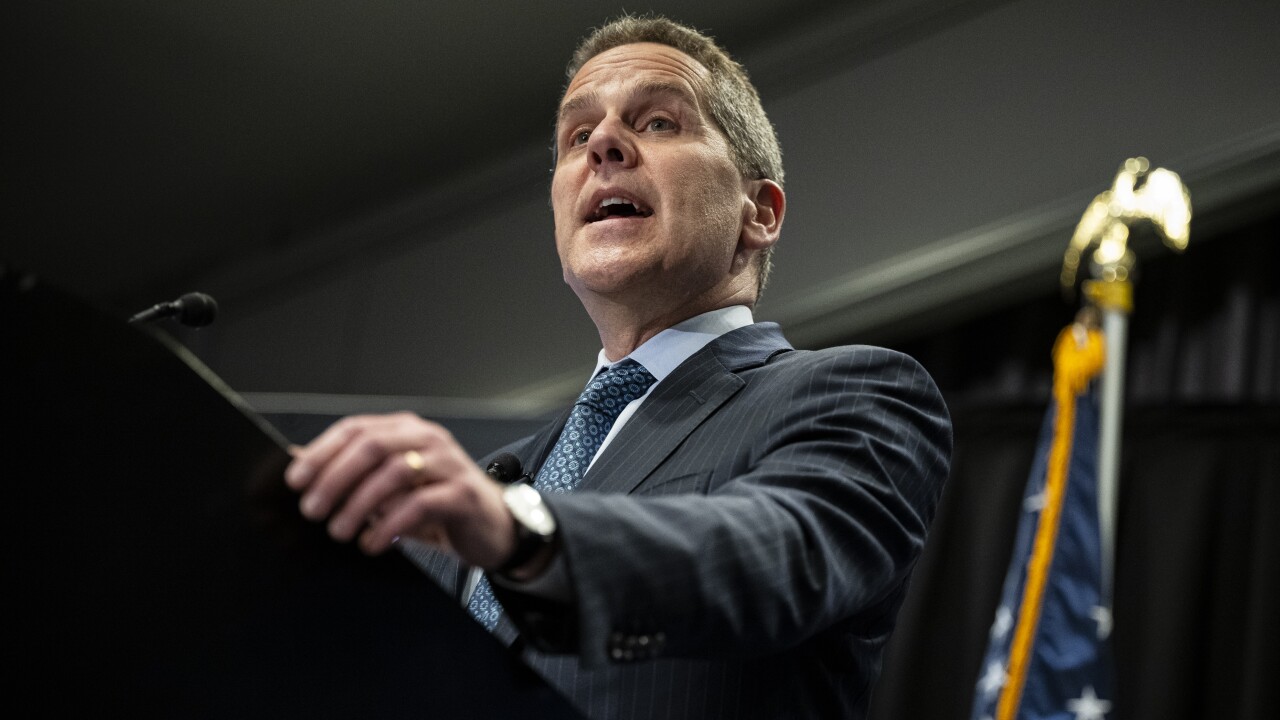-
Regulatory reform is likely to continue on its current path if Janet Yellen, the Federal Reserve Board's vice chairman, is tapped to lead the central bank. The future is decidedly murkier if Larry Summers wins the post.
July 29 -
Members of the Senate Banking Committee quickly took sides in the brewing battle over the nomination of Janet Yellen to head the Federal Reserve Board, but it was already apparent that she was ultimately likely to win confirmation.
October 9
On the historic occasion of Janet Yellen's nomination as chairwoman of the Federal Reserve, I cannot help but remember when I started my career at the Federal Reserve Bank of New York. I was one of the few women and a minority as well in a professional role. I could count on one hand the number of senior women in the entire Federal Reserve System. I laugh now upon remembering that I was seen as a trailblazer by the foreign exchange team the day that I showed up wearing a pantsuit. Dresses were part of the unspoken dress code for women. This was not the 1950s; it was the early 1990s.
If confirmed, which is likely, Yellen will lead a very different Federal Reserve. The central bank is a much more diverse institution, in terms of ethnicity and gender and also the macroeconomic and financial regulatory challenges it faces. Yellen's major challenge will be to manage carefully how the Fed transitions the U.S. economy from the unprecedented use of numerous monetary policy tools necessary to stimulate it to a tighter monetary policy that does not wreak chaos in the global financial markets. She is well-versed on monetary policy and has a distinguished, public record of accurately forecasting the economy. This leads me to believe that she will conduct monetary policy in the vein of Chairman Ben Bernanke, with a focus on decreasing unemployment while keeping inflation in check.
Yet, it is important to remember that, in addition to macroeconomic policies, the Fed also has another major role as the lead agency in macroprudential financial regulation. Due to the economic devastation caused by the global financial crisis, the Dodd-Frank Act has empowered the Fed with even more responsibilities in the area of financial regulation than before. Not only is the Federal Reserve the lead agency in regulating banks but also now, through its membership in the Financial Stability Oversight Council, it also can regulate the increasingly powerful shadow financial institutions.
Moreover, given the interconnectedness of global systemic important banks and other significant financial institutions, any financial regulation the Federal Reserve writes and implements has significant implications around the world.
There is very little in Yellen's professional history that tells us definitively how she will lead in the area of financial regulation. Yet, this summer she made a number of comments that give some insight into her views. She is a centrist who is unlikely to support efforts that would forcefully break banks apart, such as the new Glass-Steagall act, proposed by Sens. Elizabeth Warren, D-Mass., and John McCain, R-Ariz.
However, financial institutions should be on notice that Yellen will make reforming the whole financial sector a cornerstone of her tenure. A
Yellen has made it known that there is more work to be done when it comes to having a stronger Net Stable Funding Ratio, which focuses on improving banks' funding imbalance for a one-year period. What is likely to displease too big to fail banks is that she also advocates a stricter
Yellen's comments demonstrate her awareness that in order to really make the financial sector stronger, the Federal Reserve needs to focus on nonbanks as well. Otherwise, Basel III and Dodd-Frank will simply end up transferring major banks risks to the less regulated
Yellen's successor as vice chair will also be critical for global financial reform. One possible appointee, Fed governor Daniel Tarullo, has a very public record of wanting to reform banks without the blunt tool of going back to Glass Steagall. I, for one, would welcome being able to say that behind every great woman stands a great man.
Fortunately, Yellen has an important quality that was sorely lacking in former Fed chair frontrunner Larry Summers, which will be critical in global financial reform: she is a consensus builder. In an era where large, western financial institutions have hundreds of subsidiaries globally and when emerging market banks are getting bigger, it is important to have someone who will try to build consensus with her counterparts in cross-border capital and resolution regulations. Long gone are the days that the U.S. can think of regulation without thinking about the rest of the world.
I may not be as great a forecaster as Yellen. I may not be able to predict with a 100% confidence level how she will lead in regulating the financial sector. However, I can forecast with 100% certainty that when I tuck my toddler girl and boy in bed tonight, I will tell them about a country where a woman, who sometimes wears pantsuits, has just been nominated to lead the most important central bank in the world. And thankfully, it is not a fairy tale.
Mayra Rodríguez Valladares is Managing Principal at





